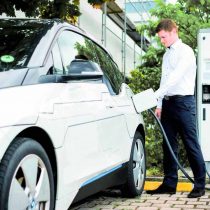
The accelerated transformation of the European automotive industry towards electromobility goes hand in hand with the objectives established in the Paris Agreement, in addition to the actions promoted by various countries around the world to mitigate greenhouse gas emissions, and Chile is no exception, could we adopt a decision like the European one, when?
We spoke with Andrés Rebolledo, director of the Transurbano Foundation, expert in electromobility and former Minister of Energy in the second government of Michelle Bachelet, who gave us an idea of the Chilean panorama regarding electromobility, its challenges and projections.
As for the EU’s statements regarding stopping selling combustion cars from 2035, how could it contribute to the goal of zero carbon neutrality by stopping selling combustion cars?
One of the fundamental tools to achieve the goal of carbon neutrality in different countries is to clean up the vehicle fleet, this means taking out cars with traditional combustion based on fossil fuels to zero emission cars. Within which the vehicles will be the main ones. In that sense, the decision taken by the European Union to sell only zero-emission vehicles from 2035 is very important, because it will not only determine what will happen in the European market, but also puts pressure on what other partners in the world do, such as China, the United States, Japan, etc.. that probably in the light of the outcome of last week’s IPCC report, it may bring forward such sessions and consequently take steps to advance policies to change the vehicle fleet.
In essence, electromobility is a central contribution, understanding that today transport in general accounts for 30% of all emissions in the world, and therefore it is absolutely crucial to make decisions in that regard to achieve carbon neutrality.
Do you think it is possible to implement that measure in Chile?
It seems to me that in the case of Chile the objectives that are proposed of 100% public transport by 2040 and a significant percentage of private vehicles also zero emission on that date, I think it is possible to imagine accordingly for that date (2035), perhaps not a zero marketing policy for polluting vehicles, but by the year 2040 in Chile the conditions are in place for them. We’re moving forward on the generation matrix, and I think in addition to that, it makes sense for transportation to be electrified and use these cleaner sources. In that sense, around 2040 is a reasonable date for the Chilean case.
With regard to the combustion cars that are already circulating in our country, is there the possibility of converting them to electric ones?
Unfortunately in Chile until a few years ago you could convert old vehicles to electric vehicles, but a couple of years ago by decisions of the authority based on safety issues, today they can not be converted. Therefore, there is a pending standard that must be resolved soon and hopefully accelerated for the purposes of being able to enable that activity, because effectively being able to have electric vehicles is a way to advance in greater electromobility. It provides a solution to the old vehicle fleet and allows access to cheaper electric vehicles. It is an outstanding issue that must be resolved and the government must move quickly on that.
How is the Foundation working to make electromobility a reality in our country?
The Foundation has incorporated electromobility as a recent axis of work, understanding that it is a fundamental tool to decontaminate and advance this objective of the energy transition in a broad sense, in addition, in a logic of friendlier and smarter cities that allow to have modes of transport more in line with environmental commitments and with facilities for citizens.
Electromobility is a fundamental tool, and in that sense what the Foundation intends is to provide the elements to indicate and point out the relevance of this, and to be a driver in that sense of the incorporation of electromobility in this case in the different cities of our country and in productive activities also, not only in the cities but also in different economic sectors of goods and services where electromobility also it’s a solutionn to clean up those production processes.
What are the challenges that Chile presents with regard to electromobility?
The fundamental thing in the case of our country is to try to promote on a larger scale the incorporation of electromobility in the different areas. There has been a lot of progress in public transport, there are almost 800 buses in Santiago and little by little they are incorporated in other cities of the country.
There is a challenge in itself, which is to get the buses to regions, and not only programs like “my electric taxi” in Santiago, but also in regions. I think it is also important to have a planning look at the charging infrastructure, so as to enable electromobility to the extent that the cargo located in the territory is well ordered, and also the interoperability of charging stations and the electric liner in such a way that one can transport between cities, if not also in an interurban way with tranquility and security.
And by the way, one of the fundamental challenges is access to electric vehicles, which today are still expensive, involving a significant investment. Therefore, eventually programs and plans that allow give an incentive in that area, it could be. In the tax field give tax exemptions, circulation permits, or tax to fossil combustion vehicles that could in some way generate funds that could support the consumption of electric vehicles in the field of circulation eventually, for a time that electric vehicles or parking lots have preference for them. These could perhaps be tools to incentivize demand for these electric vehicles.
What are the projections of electromobility for our country?
Regarding the projections, around 2040 in Chile the presence of electric vehicles should be consolidated.





